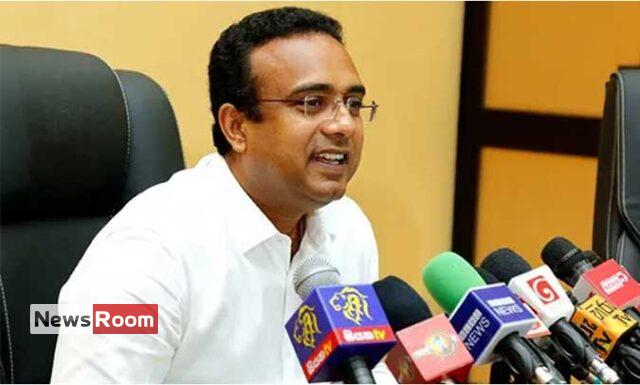The Resolution for the implementation of the arrangement under the Extended Fund Facility (EFF) of the IMF for Sri Lanka was passed in Parliament by a majority of 95 Votes with 120 voting in favour and 25 voting against.
Except for AHM Fowzie all other SJB members were not present in the chamber at the time of voting. TNA MPs too were absent. The JVP, SLPP-splinter Nidahasa Janatha Sadhanaya and Utthara Lanka Sabhagaya voted against the resolution. Ven Aturaliye Ratana thero and Tamil Congress Leader GG Ponnamblam also voted against the resolution.
Observers noted thar 120 ayes recieved by the government were well short of 134 votes received by Ranil Wickremesinghe when Parliament voted him into the presidency on July 20, last year.
The debate on the agreement reached with the IMF began after President Ranil Wickremesinghe made a special statement in Parliament on Wednesday. The debate was held for three days.
The main opposition SJB abstained from participating in the debate from the second half of the final day accusing the government of failing to table the IMF/EFF agreement in the House.
After leaving the Chamber, the SJB issued the following news release under the signature of Chief Opposition Whip and Kandy District MP Lakshman Kiriella: “The Government is seeking Parliamentary approval, post facto, for the agreement it has entered into with IMF based on Cabinet approval. This is not the first time Sri Lanka is obtaining bailout packages from IMF. Even the last such program (16th bailout package) was abruptly ended by the present government when it came in to office in 2019.
“The IMF staff level agreement on an Extended Fund Facility (EFF) with Sri Lanka is aimed at restoring macroeconomic stability and debt sustainability while safeguarding financial sector stability, protecting the vulnerability and stepping up structural reforms to address corruption vulnerabilities and unlock Sri Lanka’s growth potential.
“It is incumbent upon the current government to walk the talk on these promises. However, given its previous actions it is doubtful whether going forward, the government will fulfill its promises to the IMF.
The SIB has grave reservations in supporting Parliament approval for this agreement for the following reasons:
Lack of transparency
“It took the government 200 days to table the arrangement with the IMF in Parliament after reaching an understanding with IMF officials. During this period, the government did not engage Parliament or the Public Finance Committee to discuss the agreement.
Fiscal consolidation
“The focus of fiscal consolidation is increasing revenue, while there is no reference to cutting expenditure, which is equally important.
Inequitable Tax burdens on the working classes
“In order to raise revenue, the government has agreed with the IMF to take the easy way out by increasing taxes on the working classes most of whom are already in the tax net. Tax slabs have been narrowed and rates increased sharply. These segments of the population are already weighed down by the burden of high inflation, escalation in energy costs etc.
“There is no commitment to widen the tax net and ensure enforced collection on the higher income groups which have for years evaded taxes. Taxation of the rich via wealth and inheritance taxes are to be introduced only in 2025.
Social Security Nets
“The poor and vulnerable require continued support through financial transfers. The government proposes to continue use of the current politicized process to target relief payments instead of developing a scientific and foolproof system that ensures leakages are minimized and the deserving beneficiaries are identified.
Financial Services Sector Stability
“The absence of safeguards to ensure the stability of the financial services sector through the Sovereign Debt Restructuring process. A Domestic Debt Restructuring (DDR) will have disastrous consequences for the domestic banking sector by destabilizing it both from a liquidity and capital adequacy perspective. A DDR will also seriously erode the value of employee superannuation funds (EPF/ETF).
“We are opposed to actions that will weaken the banking and financial services sector as a whole, already burdened by high nonperforming loans due to four years of challenges due to the Constitutional Coup, Easter Attacks, the pandemic and disruptions caused in 2022.
Inadequate assurances and Anti-corruption measures
“There has been no assurances provided by the President nor members of the Cabinet that the stubborn problems related to corruption vulnerabilities will be addressed and prioritized.
“In view of the shortcomings in the agreement mentioned above, SJB considers it a futile effort to support this government on this agreement which is already in operation and binding on the government of Sri Lanka.
“The sole responsibility for meeting the commitments under the agreement with the IMF lies with the government, whether the Parliament approves it or not. Therefore we, the SJB are refraining from voting in favour of this agreement as in our view it has not been well negotiated to safeguard the people of the nation at large and in particular vulnerable communities.”








